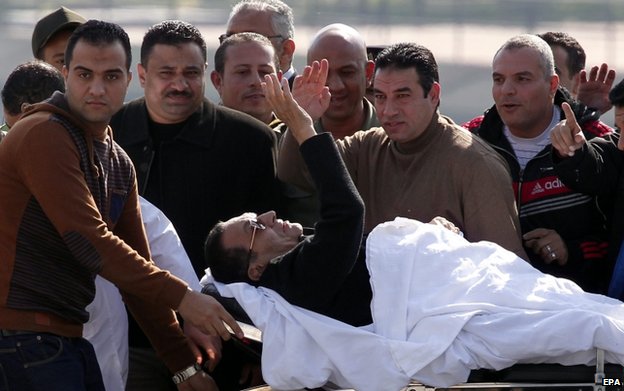A court in Egypt has dropped charges against former President Hosni Mubarak over the killing of 239 protesters during the 2011 uprising against him.
The Cairo courtroom erupted in cheers when the judge concluded Mubarak’s retrial by dismissing the case.
Charges against seven of Mubarak’s senior officials, including his interior minister, were also dropped.
Mubarak, 86, is serving a separate three-year sentence for embezzlement of public funds.
Mubarak, his former Interior Minister, Habib al-Adly, and six others had been convicted of conspiracy to kill and were sentenced to life in prison in June 2012, but a retrial was ordered last year on a technicality.
In all, some 800 people are thought to have been killed as security forces battled protesters in the weeks before Mubarak resigned on 11 February 2011.



However, the court documents at the trial related to the deaths of 239 people and injuries sustained by 1,588, across 11 of the country’s regions.
As well as the murder charge, Mubarak was also cleared of a corruption charge involving gas exports to Israel.
His sons Gamal and Alaa were also cleared of separate corruption charges by the same court on Saturday.
As supporters cheered the verdict, his sons and co-defendants stooped down to kiss his forehead.
Mubarak’s lawyer, Farid al-Deeb, told AFP news agency the verdict was a “good ruling that proved the integrity of Mubarak’s era”.
Later in a TV interview by phone Mubarak said he had done “nothing wrong at all”, AFP news agency reported.
Relatives of those killed in 2011 had awaited Saturday’s verdict with trepidation.
Mahmoud Ibrahim Ali, whose wife was killed, had little faith in the judiciary, believing it simply did the government’s bidding.
“The regime is the same,” he told AP news agency. “Names have changed but everything is the same.”

Mubarak’s elected successor, President Mohammed Morsi, lasted only a year in power before being ousted by the military in July 2013 during mass anti-government protests.
Army chief Abdul Fattah al-Sisi was subsequently elected in his place and under his rule, TV stations and newspapers have largely dropped criticism of the Mubarak era, correspondents say.
Source: BBC


